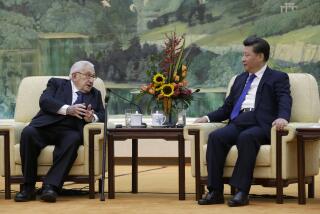Reagan Aide Supports Criticism of Arms Plan : Rowny Calls Nixon-Kissinger Arguments on Mid-Range Missiles ‘Refreshing and Helpful’
- Share via
WASHINGTON — Veering sharply away from Administration policy, Edward L. Rowny, President Reagan’s arms control adviser, said Monday that the United States should seriously consider insisting on major changes in the nuclear arms reduction agreement being negotiated with the Soviet Union.
Rowny called criticism by Richard M. Nixon and Henry A. Kissinger of the proposed agreement “refreshing and helpful.” He said that the former President and his chief foreign policy adviser have made strong arguments that the United States should not sign the agreement unless the Soviets agree to two changes in the pact.
Nixon and Kissinger, in a column for the Los Angeles Times Syndicate that was published Sunday, wrote that it would be a “profound mistake” to sign the agreement now being worked out by U.S. and Soviet negotiators unless the pact provides for:
--Linking the withdrawal of intermediate-range missiles from Europe to the elimination of the Soviets’ overwhelming advantage in conventional forces.
--Eliminating all these missiles instead of allowing the Soviets to retain 100 nuclear warheads in Asia, balanced by 100 U.S. warheads on medium-range missiles in the United States.
No Non-Nuclear Link
Rowny insisted that “what I’m saying is what President Reagan has been saying,” although he conceded that the Administration has been pursuing an accord on intermediate-range missiles without linking it to a reduction in conventional Soviet forces.
Other Administration officials, flatly rejecting the criticism by Nixon and Kissinger, have said that the conditions outlined by the two former officials could kill hopes for an arms control agreement.
But Rowny, interviewed during a breakfast session with reporters, said he agrees with the Nixon-Kissinger argument that the accord endorsed in principle by Reagan eventually could leave Western Europe vulnerable to conventional Soviet forces or to blackmail with Soviet-based nuclear weapons.
Rowny, a retired Army lieutenant general known for his hard-line approach to arms negotiations, also suggested to a reporter that White House Chief of Staff Howard H. Baker Jr. did not have enough facts when he spoke optimistically in California recently about the prospects for approving the arms reduction agreement.
Baker repeatedly expressed his optimism on April 13 in Santa Barbara before Secretary of State George P. Shultz had reported on his sessions in Moscow with Soviet Foreign Minister Eduard A. Shevardnadze.
Rowny said: “When you’re sitting out there in California . . . , you really don’t know what’s going on. He might have been looking at the positive and not negative side.”
Rowny told reporters that both the major points raised by Nixon and Kissinger in their column had been debated within the Administration and that there was considerable support for insisting on linking the withdrawal of intermediate-range missiles from Europe to a reduction in Soviet conventional forces.
Nixon had made his views known to several Administration officials, including Reagan, before disclosing them in the column with Kissinger, according to Rowny.
No Tie to Missiles
At the White House, spokesman Marlin Fitzwater said that Reagan has not spoken with Nixon or Kissinger about their column. Asked about their criticism, Fitzwater said: “We’re concerned about conventional force imbalances, but we . . . don’t believe that they need to be tied to an (intermediate-range missile) agreement.”
Fitzwater also said that the Administration agrees with Nixon and Kissinger that it would be easier to verify compliance with an agreement if the Soviets were not allowed to keep 100 warheads in Asia. “We are pressing the Soviets to agree to total . . . elimination” of the missiles, he said.
Kenneth L. Adelman, director of the Arms Control and Disarmament Agency, when told of Rowny’s remarks, said that the United States intends that an agreement would reverse the growth of the Soviets’ mobile SS-20 missiles, which carry three warheads each.
“It’s going to do that in spades,” he said. “Now people are heaping more and more chores on the . . . negotiations that it was never set up to handle. Furthermore, I don’t believe arms control negotiations ever will remedy the conventional unbalances in Europe. Either the imbalance will remain or Europeans will have to do more to help narrow the gap.”
Rowny, while praising Nixon and Kissinger for “thinking strategically,” criticized the Administration’s arms negotiators in Geneva for focusing on what he called “minutiae.” The United States, he said, has focused “too much on the day-to-day while leaving strategic considerations to the Soviets” and letting them set the agenda.
Rowny faulted U.S. arms negotiators for not focusing on “the Reagan agenda,” which includes not only arms control but human rights and bilateral issues and such regional concerns as the Soviet occupation of Afghanistan and Soviet support of subversion in Central America.
More to Read
Get the L.A. Times Politics newsletter
Deeply reported insights into legislation, politics and policy from Sacramento, Washington and beyond. In your inbox twice per week.
You may occasionally receive promotional content from the Los Angeles Times.










